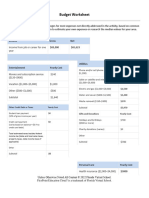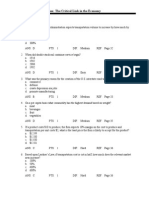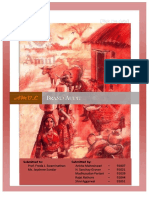BHN - Budgeting
BHN - Budgeting
Uploaded by
Gruia NedelciucCopyright:
Available Formats
BHN - Budgeting
BHN - Budgeting
Uploaded by
Gruia NedelciucCopyright
Available Formats
Share this document
Did you find this document useful?
Is this content inappropriate?
Copyright:
Available Formats
BHN - Budgeting
BHN - Budgeting
Uploaded by
Gruia NedelciucCopyright:
Available Formats
BUILD YOUR SKILLS - Budgeting
1. What is a budget and what does budgeting mean?
2. List several reasons for maintaining a budget.
3. Explain the difference between fixed expenses and variable (flexible) expenses.
4. Identify each of the following as a fixed expense or a variable expense.
a) rent b) groceries c) property taxes d) mortgage payments e) recreation
5. Mazyn’s budget for the month of April is shown below.
INCOME Budget Actual Difference
Job $3200 $3200 $0
Other $0 $140 +$140
Total monthly income $3200 $3340 +$140
EXPENSES Budget Actual Difference
Fixed expenses
Savings $200 $200 $0
Rent $800 $800 $0
Car insurance $210 $210 $0
Car payment $430 $430 $0
Cell phone service $75 $75 $0
Home internet service $90 $90 $0
Video/music streaming services $40 $40 $0
Piano lessons $100 $100 $0
Variable expenses
Food and dining Out $300 $334 +$34
Utilities $260 $252 –$8
Transportation
Gas $200 $218 +$18
Parking $0 $10 +$10
Maintenance/repairs $0 $0 $0
Clothing $100 $88 –$12
Entertainment $100 $120 +$20
Personal items $30 $25 –$5
Household items $50 $42 –$8
Miscellaneous $0 $85 +$85
Total monthly expenses $2985 $3119 +$134
a) In what areas did Mazyn spend more than he planned? Less than he planned?
b) Suppose Mazyn’s car required a $350 repair in April. If all other expenses were paid as
shown above, what is the most that he could put into savings at the end of the month?
c) After moving, Mazyn’s rent becomes $1200/month. How can he modify his budget to
support this change?
334 7.1 – Budget
6. Explain the difference between gross income and net income.
7. Explain the difference between discretionary expenses and non-discretionary expenses.
8. David and Katherine have one child. Their combined gross income is $152 800/year. Katherine’s
net pay is $1040/week and David’s is $2405 bi-weekly (every two weeks). They wish to create a
monthly budget based on the following expenses.
Mortgage: $900 bi-weekly Transportation: $225/week
Taxes: $2900/year Cell phone service: $160/month
Insurance: $355/month Home internet service: $95/month
Loan payments: $390/month Clothing: $3000/year
Car payment: $450/month Savings: $250 bi-weekly
Childcare: $375/week Entertainment: $300/month
Food: $200/week Gifts: $1400/year
Utilities: $340/month Miscellaneous: $600/month
a) Calculate Katherine and David’s combined net income per year.
b) Copy and complete the monthly INCOME Budget
budget shown on the right using Katherine’s job
the information above (round all David’s job
values to the nearest dollar). Total monthly income
c) How much more per month could EXPENSES Budget
Katherine and David afford to put Mortgage
towards paying off their mortgage Taxes
faster? Insurance
Loan payments
d) With a partner, discuss how the
Car payment
monthly budget could be
Childcare
modified for each of the
Food
following cases.
Utilities
i) The couple has another child. Transportation
Cell phone service
ii) The car is paid off.
Home internet service
iii) David or Katherine becomes Clothing
unemployed. Savings
Entertainment
Gifts
9. Research and compare the possible Miscellaneous
monthly expenses for each of the Total monthly expenses
following currently living in your area.
• family of four • postsecondary student • single working adult • single parent of one child
10. Create a current monthly budget for yourself and predict how it will change over the next
decade.
7.1 – Budget 335
CHECK YOUR UNDERSTANDING
1. A budget is essentially a spending plan based on income and expenses. It’s an estimate of how
much money will be earned and spent during a set period of time. Budgeting is the act of creating
and maintaining a budget.
2. Answers may vary. For example,
• determining how much money is available to spend
• deciding how money will be spent
• planning for future financial goals
• learning to live on less than the available income
• avoiding financial trouble
3. Fixed expenses are costs that have a constant value and are largely predictable, whereas the
ANSWERS
values of variable (flexible) expenses change regularly and can be affected by day-to-day
events/choices.
4. a) fixed expense b) variable expense c) fixed expense d) fixed expense
e) variable expense
5. a) Mazyn spent more than he planned on food and dining out, gas, parking, entertainment, and
miscellaneous items. He spent less than planned on utilities, clothing, personal items and
household items.
b) $71
c) Answers may vary. For example, he could reduce his budget for nonessential items, such as
entertainment. He could also consider downgrading his cell phone and home internet plans
and/or possibly reduce the frequency of his piano lessons until more income becomes
available.
6. Gross income is the amount earned before taxes, benefits and other payroll deductions are
withheld. Net income is the actual take-home pay.
7. Discretionary expenses are nonessential expenses. Individuals or households can survive without
discretionary expenses. Non-discretionary expenses, on the other hand, are mandatory costs and
are needed for survival.
336 7.1 – Budget
8. a) $116 610
b) INCOME Budget
Katherine’s job $4507
David’s job $5211
Total monthly income $9718
EXPENSES Budget
Mortgage $1950
Taxes $242
Insurance $355
Loan payments $390
Car payment $450
Childcare $1625
Food $867
Utilities $340
Transportation $975
Cell phone service $160
Home internet service $95
Clothing $250
Savings $542
Entertainment $300
Gifts $117
ANSWERS
Miscellaneous $600
Total monthly expenses $9258
c) $460
d) Answers will vary.
9. Answers will vary.
10. Answers will vary.
7.1 – Budget 337
You might also like
- 6.01 Financial Statements ActivityDocument2 pages6.01 Financial Statements ActivityAditya Nigam100% (1)
- Redacted 2019 Financial ReportDocument7 pagesRedacted 2019 Financial ReportDepDepFinancial100% (3)
- Pub 101 Introduction To Public Administration IDocument64 pagesPub 101 Introduction To Public Administration IFredrick Okereke100% (7)
- Economy Chapter 2 Lesson 6Document9 pagesEconomy Chapter 2 Lesson 6허예스No ratings yet
- Maxed Out Budget Template v3Document1 pageMaxed Out Budget Template v3Billy CNo ratings yet
- Personal Finance For Canadians 9th Edition Currie Solutions ManualDocument9 pagesPersonal Finance For Canadians 9th Edition Currie Solutions ManualLesterBriggssNo ratings yet
- Richc Dad Financial Statement TemplateDocument10 pagesRichc Dad Financial Statement TemplatealwaysleadneverfollowNo ratings yet
- RDB Palm Olein (CP8) & Crude Palm Oil (CPO) For Sale (Domestic - Export) - 06092012Document2 pagesRDB Palm Olein (CP8) & Crude Palm Oil (CPO) For Sale (Domestic - Export) - 06092012reewal67% (6)
- Asm401 - Individual Reflection PaperDocument4 pagesAsm401 - Individual Reflection PaperHaa'ilah AzharNo ratings yet
- Budget - CYUDocument5 pagesBudget - CYUcesarjuarezjuarez23No ratings yet
- Budget - CYUDocument3 pagesBudget - CYUcesarjuarezjuarez23No ratings yet
- 2022.debate and Individual ExercisesDocument5 pages2022.debate and Individual ExercisesDuy AAnhNo ratings yet
- Personal FinanceDocument5 pagesPersonal Financesk8rknightNo ratings yet
- Finance Excel Assignment 1Document11 pagesFinance Excel Assignment 1matrixmoe08No ratings yet
- Unit 3 Assignment: A Simple BudgetDocument5 pagesUnit 3 Assignment: A Simple BudgetNguyên KhánhNo ratings yet
- Financial Literacy-Student GuideDocument6 pagesFinancial Literacy-Student Guidetrent123456789No ratings yet
- Budget Analysis Activity-1 Kaitlyn NealDocument5 pagesBudget Analysis Activity-1 Kaitlyn Nealapi-627152429No ratings yet
- 2024 Truth in Taxation PresentationDocument19 pages2024 Truth in Taxation PresentationinforumdocsNo ratings yet
- Budget Worksheet: Career Graphic DesignerDocument5 pagesBudget Worksheet: Career Graphic DesignerArkoNo ratings yet
- Sorted - Budgeting Booklet 2019Document12 pagesSorted - Budgeting Booklet 2019Gibbs NguyoNo ratings yet
- Creating A BudgetDocument2 pagesCreating A BudgetLaci NunesNo ratings yet
- 1 Math 9 Startup AssignmentDocument8 pages1 Math 9 Startup Assignmentstephanie.rcNo ratings yet
- 11a - 21feb2017 - Buying Your First HDB HomeDocument15 pages11a - 21feb2017 - Buying Your First HDB HomeHan Meng KohNo ratings yet
- 1.09 - Jackson Combass 09.22.2023Document5 pages1.09 - Jackson Combass 09.22.2023jackson combassNo ratings yet
- Chapter 3 - RecordkeepingDocument4 pagesChapter 3 - RecordkeepingChristian Paul CayagoNo ratings yet
- Term 3 and 4 Activity Book 2Document48 pagesTerm 3 and 4 Activity Book 2anishatadiwa492No ratings yet
- Budget Analysis Activity PDFDocument4 pagesBudget Analysis Activity PDFapi-685545642No ratings yet
- Don and Daisy BudgetDocument2 pagesDon and Daisy BudgetRH - 10PS 790469 Streetsville SSNo ratings yet
- Budget Analysis ActivityDocument4 pagesBudget Analysis Activityapi-685760092No ratings yet
- Running Head: Career and Budget Report 1Document6 pagesRunning Head: Career and Budget Report 1Stephen MunozNo ratings yet
- Budget Analysis PDFDocument5 pagesBudget Analysis PDFapi-626791287No ratings yet
- Michael Bell - IEF Monthly BudgetDocument6 pagesMichael Bell - IEF Monthly BudgetgoozyhotbarNo ratings yet
- Financial Literacy-Student Guide (7) 8Document8 pagesFinancial Literacy-Student Guide (7) 8Sandra- MarroquinNo ratings yet
- English Financial ActivityDocument3 pagesEnglish Financial ActivityJose AvilezNo ratings yet
- Copy of 2510 1.09 Budget WorksheetDocument10 pagesCopy of 2510 1.09 Budget WorksheetHansiniNo ratings yet
- Noreen Ali Case Study SolutionDocument5 pagesNoreen Ali Case Study SolutionChintu WatwaniNo ratings yet
- Cost of Living: Total: $4830Document1 pageCost of Living: Total: $4830sam howgufuNo ratings yet
- Airbnb Fina CalculatorDocument12 pagesAirbnb Fina CalculatorBagus Oka100% (1)
- Personal - Financial - Statement GOALDocument1 pagePersonal - Financial - Statement GOALberkayyakinnNo ratings yet
- Family Budget PlannerDocument10 pagesFamily Budget PlannerMohamed ElhousniNo ratings yet
- Document 2Document9 pagesDocument 2api-497639120No ratings yet
- Running Head: Career and Budget Report 1Document6 pagesRunning Head: Career and Budget Report 1Stephen MunozNo ratings yet
- Personal-Monthly-Budget-TemplateDocument77 pagesPersonal-Monthly-Budget-Templateice jaden clenNo ratings yet
- Financial Algebra Budget ProjectDocument15 pagesFinancial Algebra Budget Projectapi-502440235No ratings yet
- 01.06 Budget WorksheetDocument3 pages01.06 Budget Worksheetaniyah.albritton82No ratings yet
- Document4Document6 pagesDocument4shreyashvanapalli43No ratings yet
- 6 Budget WorksheetDocument3 pages6 Budget Worksheetmerxedes xoNo ratings yet
- Career 2201: Budget Assignment: SectionDocument4 pagesCareer 2201: Budget Assignment: SectionInnocent MapaNo ratings yet
- Monthly Budget Plan TemplateDocument19 pagesMonthly Budget Plan Templatewaxoge4343No ratings yet
- Budget WorksheetDocument4 pagesBudget Worksheetsenuli WithanachchiNo ratings yet
- Chapter 2 SolutionsDocument8 pagesChapter 2 SolutionsSam ParkerNo ratings yet
- Numeracy and Money: Guião de Trabalho 04Document11 pagesNumeracy and Money: Guião de Trabalho 04Lena Maria LimaNo ratings yet
- 6. Family Budget ScaffoldDocument3 pages6. Family Budget ScaffoldxuauNo ratings yet
- Bookkeeping Basics: Name - Block - DateDocument12 pagesBookkeeping Basics: Name - Block - DateMaria AparicioNo ratings yet
- Jinder Personal Budget 2Document5 pagesJinder Personal Budget 2Musk AanNo ratings yet
- Simple Personal Cash Flow StatementDocument41 pagesSimple Personal Cash Flow Statementnimeshshah2021No ratings yet
- Calculative Questions Chapter 10 Measuring A Nations IncomeDocument14 pagesCalculative Questions Chapter 10 Measuring A Nations IncomeVũ Hồng PhươngNo ratings yet
- Managing Your Personal FinanceDocument20 pagesManaging Your Personal FinanceshainasNo ratings yet
- My Budget: Your Total IncomeDocument3 pagesMy Budget: Your Total Incomeyun3No ratings yet
- Budget AssignmentDocument9 pagesBudget Assignmentapi-537656189No ratings yet
- Your Income Should Increase Every Year 2: Financial Freedom, #151From EverandYour Income Should Increase Every Year 2: Financial Freedom, #151No ratings yet
- 2023 3Q Emart Earnings Report_ENGDocument11 pages2023 3Q Emart Earnings Report_ENGjeremy.guangNo ratings yet
- 14 Public Administration - Introduction, Meaning, Significance and ScopeDocument12 pages14 Public Administration - Introduction, Meaning, Significance and ScopeSafarNo ratings yet
- Chapter 1 TestbankDocument7 pagesChapter 1 TestbankpraktekalNo ratings yet
- Hsslive XI BUSINESS STUDIES Notes 2019 20 Sanal Signed PDFDocument82 pagesHsslive XI BUSINESS STUDIES Notes 2019 20 Sanal Signed PDFJazeem MpNo ratings yet
- Atc Guild 2011-KaulDocument23 pagesAtc Guild 2011-KaulArunkumarNo ratings yet
- Project Report of SLICDocument87 pagesProject Report of SLIChimanshu gupta100% (1)
- CFLCBrazil Impact of Western Public Finance in Least Developed CountriesDocument10 pagesCFLCBrazil Impact of Western Public Finance in Least Developed Countriescluadine dinerosNo ratings yet
- MAIN PROJECT Part 2Document13 pagesMAIN PROJECT Part 2Abantika SahaNo ratings yet
- Business and Management - Course Companion - Lominé Muchena and Pierce - Oxford 2014Document95 pagesBusiness and Management - Course Companion - Lominé Muchena and Pierce - Oxford 2014Anthony Mafuta MayilameneNo ratings yet
- Financial Market - 02 Task Performance 1Document9 pagesFinancial Market - 02 Task Performance 1Catherine LaguitaoNo ratings yet
- Agra - SSS Law - 102017Document34 pagesAgra - SSS Law - 102017Andrea DeloviarNo ratings yet
- OAU 1980 Lagos Plan of Action for the Economic Development of AfricaDocument104 pagesOAU 1980 Lagos Plan of Action for the Economic Development of Africakamakeita86No ratings yet
- Retail MM ChannelDocument3 pagesRetail MM ChannelSnider JohnNo ratings yet
- Resume Sana Hassan 2022Document2 pagesResume Sana Hassan 2022Sana HassanNo ratings yet
- Introduction To Iso 55000 Asset ManagementDocument25 pagesIntroduction To Iso 55000 Asset ManagementAndreja Zelenković100% (4)
- Market Analysis Report NetflixDocument10 pagesMarket Analysis Report NetflixsantamargaritaNo ratings yet
- Amul Brand AuditDocument25 pagesAmul Brand AuditRoopeshkumar YadavNo ratings yet
- Macroeconomics: For People Who Think Hwachong Notes SuckDocument21 pagesMacroeconomics: For People Who Think Hwachong Notes SuckkulsumNo ratings yet
- Lesson 5 Accounting For Partnership Liquidation - Lump SumDocument13 pagesLesson 5 Accounting For Partnership Liquidation - Lump SumKenneth NinalgaNo ratings yet
- Ernesto Serote - 02 PLANNING MANDATES OF LOCAL GOVERNMENTS PDFDocument29 pagesErnesto Serote - 02 PLANNING MANDATES OF LOCAL GOVERNMENTS PDFsmol adlawan-margate100% (1)
- EntrepreneursDocument2 pagesEntrepreneursEllaine Pearl AlmillaNo ratings yet
- Environmental ConsultantDocument2 pagesEnvironmental ConsultantsaleenasirajNo ratings yet
- 10 - Getting Financing or FundingDocument29 pages10 - Getting Financing or FundingAzeem SubhaniNo ratings yet
- HR Midterm QuestionsDocument35 pagesHR Midterm Questionsbayram.durak.kiNo ratings yet
- Developments in Corporate Governance: Udo C. Braendle, Alexander N. KostyukDocument11 pagesDevelopments in Corporate Governance: Udo C. Braendle, Alexander N. KostyukArvin Loveenash RockNo ratings yet
- Gas Station Cashier ResumeDocument2 pagesGas Station Cashier ResumeClay CaustinNo ratings yet
- Supply of Goods and Supply of ServicesDocument4 pagesSupply of Goods and Supply of Serviceslightyagami000382No ratings yet

























































































